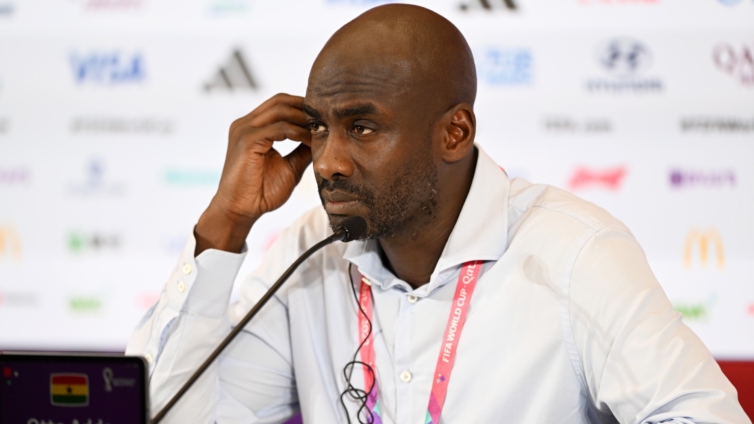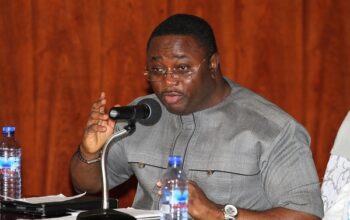Otto Addo, who later became known for his managerial prowess, had a memorable playing career with the Black Stars. However, one moment that still sticks with fans occurred during a World Cup qualifier. Addo, playing as a defender, was involved in a rather unfortunate own goal that ended up costing Ghana in a crucial match.
This own goal was one of those rare instances in football where a player’s mistake inadvertently changed the course of a game. As a defender, Addo was known for his strong performances, but on this occasion, a defensive error resulted in the ball being diverted into his net. The goal caused significant disappointment for the team and the fans, especially given how tightly contested the game was. Yet, Otto Addo’s career continued, and he eventually went on to become a respected coach, leading Ghana’s national team during their 2022 World Cup campaign, where his experience and leadership helped the team navigate difficult challenges.
While Otto Addo’s own goal became a moment of learning, Benjamin Asare‘s story is one of brilliance in the goalkeeping department. Asare’s name is etched in the annals of Ghanaian football for his remarkable performances between the posts. His crowning achievement came when he was awarded the Golden Gloves after an outstanding tournament performance in one of the regional competitions, likely during a continental competition like the Africa Cup of Nations (AFCON) or a similar event.
Asare was celebrated for his shot-stopping ability, his command of the penalty area, and his incredible reflexes. His contribution to Ghanaian football made him a household name among fans, and he became one of the standout players during his career. His Golden Gloves recognition was a testament to his dedication, hard work, and consistency in between the posts, cementing his status as one of Ghana’s greatest goalkeepers.
Kassim Ocansey, known for his dazzling runs, quick feet, and ability to unlock defences, brought a unique flair to the pitch. As one of the most gifted attacking midfielders Ghana has produced, Ocansey was known for his creative vision, deft passing, and ability to score goals. His contributions in both domestic and international competitions were crucial, especially during his time playing for clubs like Asante Kotoko and his appearances with the national team.
Ocansey’s brilliance often shone brightest when he was involved in playmaking, always providing key assists and helping teammates create scoring opportunities. His style of play was characterized by his agility and intelligence on the ball, making him a nightmare for defenders. Whether it was through a perfectly weighted pass, a mesmerizing dribble, or a well-timed shot on goal, Kassim Ocansey was a player who consistently made things happen on the field.
His performances for the Black Stars and his club teams earned him accolades and recognition as one of the country’s best creative players of his generation. Though his career may not have had the same level of international recognition as some of his peers, his impact on Ghanaian football is undeniable.
The intertwined stories of Otto Addo’s own goal, Benjamin Asare’s Golden Gloves, and Kassim Ocansey’s brilliance represents a rich tapestry of Ghanaian football—a blend of heartbreak, resilience, and genius. These players, in their own ways, highlighted the highs and lows of football, but also underscored the importance of learning from mistakes, celebrating individual brilliance, and being part of something greater than oneself.
While Otto Addo’s own goal may have been an unfortunate moment, his subsequent success as a manager speaks to his growth and resilience. Benjamin Asare’s Golden Gloves achievement remains a proud moment for Ghanaian goalkeeping, and Kassim Ocansey’s artistry on the field continues to be remembered fondly by fans who witnessed his magical playmaking skills. Together, these footballers showcase the complexities of football—where triumphs and setbacks often go hand in hand.
It seems like Otto Addo’s tenure as the head coach of the Black Stars has become a contentious subject for many football fans and pundits alike. His leadership, communication skills, and decision-making have been under intense scrutiny, especially after a run of five consecutive winless matches. His tenure as Ghana’s national team coach has been marked by several frustrating moments, and his recent comments and behaviour have only added fuel to the fire.
Addo, known for his humble beginnings and rise through the coaching ranks, seemed like an interesting choice when he took the reins of the Black Stars in 2022. He had worked as an assistant at Borussia Dortmund under Edin Terzic and had been a part of the coaching staff at the Black Stars in a temporary capacity. His limited coaching experience—essentially consisting of apprenticeships and short stints—didn’t inspire confidence in everyone, but he was given the job by the Ghana Football Association (GFA).
However, his recent remarks, where he boasted about training under Sammer, Klopp, and being part of Terzic’s staff at Dortmund, have drawn sharp criticism. “I trained under Sammer, I was trained under Klopp, and I was assistant to Edin Terzic, who was Dortmund’s Head Coach,” he said. While it’s understandable that he might want to highlight his pedigree, the way he dismissed critiques—specifically suggesting that Klopp’s or Terzic’s opinions carried more weight than those of others—has led to accusations of arrogance and lack of self-awareness.
Many fans and analysts have pointed out that Addo’s lack of humility in the face of criticism may be one of the key factors contributing to his struggles as a coach. The winless streak has exposed his weaknesses in managing the team, and his defensive posture toward criticism has made it difficult for people to take him seriously as a leader who can guide the national team back to success.
The decision by the Ghana Football Association (GFA) to appoint Otto Addo as head coach was controversial from the start. Despite having no significant managerial experience beyond his assistant roles at Dortmund and his short spell as interim coach during the 2022 World Cup, Addo was handed the reins to the national team. The GFA had initially announced specific criteria for the position, including a proven track record in coaching at the highest level. However, Addo’s appointment was seen by many as an outlier, largely based on his previous involvement with the Black Stars as an assistant and his temporary success at the World Cup, where Ghana’s performance—despite some positive moments—was still less than convincing.
Critics have pointed out that this decision set a troubling precedent, particularly when compared to some of the more experienced and accomplished managers who were overlooked. The perception is that Addo’s appointment may have been more politically motivated or based on a lack of better alternatives at the time, rather than on his credentials or potential to bring long-term success.
Otto Addo’s track record as a head coach has not been one of major success, and his recent winless streak has only exacerbated the sense that he may not be up to the task. The Black Stars have struggled to find any rhythm or consistency under his leadership, and criticism of his tactics and team selections has been growing louder.
Many have also questioned his ability to get the best out of the talented group of players available to him. With stars like Thomas Partey, Andre Ayew, Jordan Ayew, and Mohammed Kudus among others, Ghana has a wealth of potential. Yet, under Addo’s leadership, the team has failed to produce the kind of cohesive, attacking football that fans expect. The lack of results has led to further doubts about his management style, his in-game decisions, and his ability to motivate and inspire the team.
Being the head coach of a national team comes with its own unique set of challenges. Unlike club football, where coaches have more time to work on tactics, develop players, and implement systems, national team coaches have limited time with their squads and must be able to get results quickly. Otto Addo’s inexperience in this environment has been laid bare, and his communication issues have made it even harder for the public to rally behind him.
As the national team coach, Addo’s primary responsibility is to inspire confidence and trust, not only among his players but also with the Ghanaian public and the media. His inability to effectively communicate and his apparent lack of self-awareness has created an image of a coach who may be out of his depth. His defensive posture towards criticism—especially when it’s constructive—only makes his position more precarious. While Otto Addo has proven that he has potential as a coach, his continued tenure as Black Stars head coach may depend on whether he can learn from his mistakes, address his weaknesses in communication, and adapt his style to meet the demands of the role. With Ghana’s next set of important fixtures on the horizon, there is little room for further slip-ups. Ghanaian football fans are restless, and the pressure on Addo to turn the team’s fortunes around is immense.
If Addo fails to address the concerns surrounding his leadership and performance, he could face serious consequences, both professionally and personally. The future of Ghanaian football remains uncertain under his guidance, and it will take a lot more than his pedigree at Dortmund to regain the public’s trust.
It seems like there’s a growing sense of frustration around Otto Addo’s tenure as the coach of Ghana’s national football team, especially following their poor performance in the 2023 Africa Cup of Nations qualifiers. His management style and failure to achieve tangible results have led to mounting criticism from fans, pundits, and analysts alike.
Otto Addo, in his first substantive role as a senior coach, has struggled to live up to expectations, and there’s a perception that his mistakes are being overlooked, perhaps because of a false sense of security that stems from his position. The analogy of the butterfly thinking of itself as a bird seems to capture this sense of delusion—that Addo may be overestimating his worth and the esteem in which he is held.
Under Otto Addo, the Black Stars have posted one of their worst-ever qualifying campaigns in 20 years. The team has failed to impress in both the AFCON 2023 qualifiers and other competitive fixtures, leading to calls for change. For a nation that has a rich footballing tradition, regularly qualifying for international tournaments like the World Cup and AFCON, this underachievement is deeply troubling.
There’s a consensus among the fanbase and punditry that Ghana should not have been performing this poorly, especially with a squad that features a number of players who are playing in top leagues across Europe. Yet, under Addo’s leadership, there has been no cohesion or inspiring football. His tactical naivety, poor decision-making on key players and formations, and failure to extract the best from the squad have been evident.
The tone of the criticism suggests that Otto Addo might be in a comfortable position that’s giving him a sense of invincibility. He has been accused of being arrogant and dismissive of legitimate concerns, particularly regarding his communication style. His failure to address criticisms and his lack of humility have raised eyebrows. The idea that the GFA (Ghana Football Association) seems to have an inexplicable tolerance for his shortcomings adds to the sense of frustration.
If we were to look at past appointments by the GFA, it’s not hard to find instances where incompetence and mediocrity were tolerated for too long. This has led many to question whether the GFA is truly capable of making the hard decisions needed to move Ghanaian football forward. Is Otto Addo’s position truly secure because of his performance, or because of other political or administrative factors at play?
There’s a perception that the GFA has a remarkable tolerance for mediocrity when it comes to its managerial appointments. Despite Otto Addo’s questionable record, there’s no indication from the GFA that his job is under threat. This has raised eyebrows, with many questioning whether the association is more concerned about optics or internal politics rather than performance on the field. This inaction could be damaging to Ghana football, as it sends a message that poor results are tolerated.
However, this pattern is not new. The GFA has faced criticism in the past for its inability to make bold, decisive moves when it comes to coaching appointments. Many have pointed to the lack of transparency and accountability within the system, which leads to a situation where the same faces are recycled, and mediocrity is perpetuated.
In stark contrast to the struggles of Otto Addo and the Black Stars, Nations FC seems to be doing everything right at the domestic level. The club recently secured a 2-0 win over Asante Kotoko, a team that has fallen far from its previous stature, placing Nations FC at the top of the Ghana Premier League.
The man behind this turnaround is Kassim Ocansey, who has built a team that’s well-organized, tactical, and balanced. Nations FC’s rise under Ocansey’s stewardship provides a strong argument for competence and professionalism in management—qualities that Otto Addo seems to be lacking with the national team. The success of Nations FC stands in stark contrast to the national team’s struggles under Addo, underscoring the importance of effective coaching and management in achieving success.
The frustration surrounding Otto Addo as Black Stars coach is palpable. His lack of results, coupled with his arrogance and failure to address his mistakes, has only intensified calls for a change at the helm. Ghanaians expect more from their national team, especially with the talent at their disposal.
The current situation suggests that Otto Addo’s position should be re-evaluated by the GFA, especially given his inability to produce results on the field. Leadership in football isn’t just about managing players but also about managing pressure, handling criticisms constructively, and inspiring a team to perform at their best. If Addo is unable to do so, then it may be time for Ghana to look for a more competent coach to take the Black Stars forward.
As Kassim Ocansey demonstrates with Nations FC, success can only be built on sound management, a clear tactical approach, and humility in the face of challenges. Without these qualities, it will be hard for any coach to survive, let alone thrive, in Ghana’s competitive football landscape.
Bottom of ForOtto Addo, who later became known for his managerial prowess, had a memorable playing career with the Black Stars. However, one moment that still sticks with fans occurred during a World Cup qualifier. Addo, playing as a defender, was involved in a rather unfortunate own goal that ended up costing Ghana in a crucial match.
This own goal was one of those rare instances in football where a player’s mistake inadvertently changed the course of a game. As a defender, Addo was known for his strong performances, but on this occasion, a defensive error resulted in the ball being diverted into his net. The goal caused significant disappointment for the team and the fans, especially given how tightly contested the game was. Yet, Otto Addo’s career continued, and he eventually went on to become a respected coach, leading Ghana’s national team during their 2022 World Cup campaign, where his experience and leadership helped the team navigate difficult challenges.
While Otto Addo’s own goal became a moment of learning, Benjamin Asare‘s story is one of brilliance in the goalkeeping department. Asare’s name is etched in the annals of Ghanaian football for his remarkable performances between the posts. His crowning achievement came when he was awarded the Golden Gloves after an outstanding tournament performance in one of the regional competitions, likely during a continental competition like the Africa Cup of Nations (AFCON) or a similar event.
Asare was celebrated for his shot-stopping ability, his command of the penalty area, and his incredible reflexes. His contribution to Ghanaian football made him a household name among fans, and he became one of the standout players during his career. His Golden Gloves recognition was a testament to his dedication, hard work, and consistency in between the posts, cementing his status as one of Ghana’s greatest goalkeepers.
Kassim Ocansey, known for his dazzling runs, quick feet, and ability to unlock defences, brought a unique flair to the pitch. As one of the most gifted attacking midfielders Ghana has produced, Ocansey was known for his creative vision, deft passing, and ability to score goals. His contributions in both domestic and international competitions were crucial, especially during his time playing for clubs like Asante Kotoko and his appearances with the national team.
Ocansey’s brilliance often shone brightest when he was involved in playmaking, always providing key assists and helping teammates create scoring opportunities. His style of play was characterized by his agility and intelligence on the ball, making him a nightmare for defenders. Whether it was through a perfectly weighted pass, a mesmerizing dribble, or a well-timed shot on goal, Kassim Ocansey was a player who consistently made things happen on the field.
His performances for the Black Stars and his club teams earned him accolades and recognition as one of the country’s best creative players of his generation. Though his career may not have had the same level of international recognition as some of his peers, his impact on Ghanaian football is undeniable.
The intertwined stories of Otto Addo’s own goal, Benjamin Asare’s Golden Gloves, and Kassim Ocansey’s brilliance represents a rich tapestry of Ghanaian football—a blend of heartbreak, resilience, and genius. These players, in their own ways, highlighted the highs and lows of football, but also underscored the importance of learning from mistakes, celebrating individual brilliance, and being part of something greater than oneself.
While Otto Addo’s own goal may have been an unfortunate moment, his subsequent success as a manager speaks to his growth and resilience. Benjamin Asare’s Golden Gloves achievement remains a proud moment for Ghanaian goalkeeping, and Kassim Ocansey’s artistry on the field continues to be remembered fondly by fans who witnessed his magical playmaking skills. Together, these footballers showcase the complexities of football—where triumphs and setbacks often go hand in hand.
It seems like Otto Addo’s tenure as the head coach of the Black Stars has become a contentious subject for many football fans and pundits alike. His leadership, communication skills, and decision-making have been under intense scrutiny, especially after a run of five consecutive winless matches. His tenure as Ghana’s national team coach has been marked by several frustrating moments, and his recent comments and behaviour have only added fuel to the fire.
Addo, known for his humble beginnings and rise through the coaching ranks, seemed like an interesting choice when he took the reins of the Black Stars in 2022. He had worked as an assistant at Borussia Dortmund under Edin Terzic and had been a part of the coaching staff at the Black Stars in a temporary capacity. His limited coaching experience—essentially consisting of apprenticeships and short stints—didn’t inspire confidence in everyone, but he was given the job by the Ghana Football Association (GFA).
However, his recent remarks, where he boasted about training under Sammer, Klopp, and being part of Terzic’s staff at Dortmund, have drawn sharp criticism. “I trained under Sammer, I was trained under Klopp, and I was assistant to Edin Terzic, who was Dortmund’s Head Coach,” he said. While it’s understandable that he might want to highlight his pedigree, the way he dismissed critiques—specifically suggesting that Klopp’s or Terzic’s opinions carried more weight than those of others—has led to accusations of arrogance and lack of self-awareness.
Many fans and analysts have pointed out that Addo’s lack of humility in the face of criticism may be one of the key factors contributing to his struggles as a coach. The winless streak has exposed his weaknesses in managing the team, and his defensive posture toward criticism has made it difficult for people to take him seriously as a leader who can guide the national team back to success.
The decision by the Ghana Football Association (GFA) to appoint Otto Addo as head coach was controversial from the start. Despite having no significant managerial experience beyond his assistant roles at Dortmund and his short spell as interim coach during the 2022 World Cup, Addo was handed the reins to the national team. The GFA had initially announced specific criteria for the position, including a proven track record in coaching at the highest level. However, Addo’s appointment was seen by many as an outlier, largely based on his previous involvement with the Black Stars as an assistant and his temporary success at the World Cup, where Ghana’s performance—despite some positive moments—was still less than convincing.
Critics have pointed out that this decision set a troubling precedent, particularly when compared to some of the more experienced and accomplished managers who were overlooked. The perception is that Addo’s appointment may have been more politically motivated or based on a lack of better alternatives at the time, rather than on his credentials or potential to bring long-term success.
Otto Addo’s track record as a head coach has not been one of major success, and his recent winless streak has only exacerbated the sense that he may not be up to the task. The Black Stars have struggled to find any rhythm or consistency under his leadership, and criticism of his tactics and team selections has been growing louder.
Many have also questioned his ability to get the best out of the talented group of players available to him. With stars like Thomas Partey, Andre Ayew, Jordan Ayew, and Mohammed Kudus among others, Ghana has a wealth of potential. Yet, under Addo’s leadership, the team has failed to produce the kind of cohesive, attacking football that fans expect. The lack of results has led to further doubts about his management style, his in-game decisions, and his ability to motivate and inspire the team.
Being the head coach of a national team comes with its own unique set of challenges. Unlike club football, where coaches have more time to work on tactics, develop players, and implement systems, national team coaches have limited time with their squads and must be able to get results quickly. Otto Addo’s inexperience in this environment has been laid bare, and his communication issues have made it even harder for the public to rally behind him.
As the national team coach, Addo’s primary responsibility is to inspire confidence and trust, not only among his players but also with the Ghanaian public and the media. His inability to effectively communicate and his apparent lack of self-awareness has created an image of a coach who may be out of his depth. His defensive posture towards criticism—especially when it’s constructive—only makes his position more precarious. While Otto Addo has proven that he has potential as a coach, his continued tenure as Black Stars head coach may depend on whether he can learn from his mistakes, address his weaknesses in communication, and adapt his style to meet the demands of the role. With Ghana’s next set of important fixtures on the horizon, there is little room for further slip-ups. Ghanaian football fans are restless, and the pressure on Addo to turn the team’s fortunes around is immense.
If Addo fails to address the concerns surrounding his leadership and performance, he could face serious consequences, both professionally and personally. The future of Ghanaian football remains uncertain under his guidance, and it will take a lot more than his pedigree at Dortmund to regain the public’s trust.
It seems like there’s a growing sense of frustration around Otto Addo’s tenure as the coach of Ghana’s national football team, especially following their poor performance in the 2023 Africa Cup of Nations qualifiers. His management style and failure to achieve tangible results have led to mounting criticism from fans, pundits, and analysts alike.
Otto Addo, in his first substantive role as a senior coach, has struggled to live up to expectations, and there’s a perception that his mistakes are being overlooked, perhaps because of a false sense of security that stems from his position. The analogy of the butterfly thinking of itself as a bird seems to capture this sense of delusion—that Addo may be overestimating his worth and the esteem in which he is held.
Under Otto Addo, the Black Stars have posted one of their worst-ever qualifying campaigns in 20 years. The team has failed to impress in both the AFCON 2023 qualifiers and other competitive fixtures, leading to calls for change. For a nation that has a rich footballing tradition, regularly qualifying for international tournaments like the World Cup and AFCON, this underachievement is deeply troubling.
There’s a consensus among the fanbase and punditry that Ghana should not have been performing this poorly, especially with a squad that features a number of players who are playing in top leagues across Europe. Yet, under Addo’s leadership, there has been no cohesion or inspiring football. His tactical naivety, poor decision-making on key players and formations, and failure to extract the best from the squad have been evident.
The tone of the criticism suggests that Otto Addo might be in a comfortable position that’s giving him a sense of invincibility. He has been accused of being arrogant and dismissive of legitimate concerns, particularly regarding his communication style. His failure to address criticisms and his lack of humility have raised eyebrows. The idea that the GFA (Ghana Football Association) seems to have an inexplicable tolerance for his shortcomings adds to the sense of frustration.
If we were to look at past appointments by the GFA, it’s not hard to find instances where incompetence and mediocrity were tolerated for too long. This has led many to question whether the GFA is truly capable of making the hard decisions needed to move Ghanaian football forward. Is Otto Addo’s position truly secure because of his performance, or because of other political or administrative factors at play?
There’s a perception that the GFA has a remarkable tolerance for mediocrity when it comes to its managerial appointments. Despite Otto Addo’s questionable record, there’s no indication from the GFA that his job is under threat. This has raised eyebrows, with many questioning whether the association is more concerned about optics or internal politics rather than performance on the field. This inaction could be damaging to Ghana football, as it sends a message that poor results are tolerated.
However, this pattern is not new. The GFA has faced criticism in the past for its inability to make bold, decisive moves when it comes to coaching appointments. Many have pointed to the lack of transparency and accountability within the system, which leads to a situation where the same faces are recycled, and mediocrity is perpetuated.
In stark contrast to the struggles of Otto Addo and the Black Stars, Nations FC seems to be doing everything right at the domestic level. The club recently secured a 2-0 win over Asante Kotoko, a team that has fallen far from its previous stature, placing Nations FC at the top of the Ghana Premier League.
The man behind this turnaround is Kassim Ocansey, who has built a team that’s well-organized, tactical, and balanced. Nations FC’s rise under Ocansey’s stewardship provides a strong argument for competence and professionalism in management—qualities that Otto Addo seems to be lacking with the national team. The success of Nations FC stands in stark contrast to the national team’s struggles under Addo, underscoring the importance of effective coaching and management in achieving success.
The frustration surrounding Otto Addo as Black Stars coach is palpable. His lack of results, coupled with his arrogance and failure to address his mistakes, has only intensified calls for a change at the helm. Ghanaians expect more from their national team, especially with the talent at their disposal.
The current situation suggests that Otto Addo’s position should be re-evaluated by the GFA, especially given his inability to produce results on the field. Leadership in football isn’t just about managing players but also about managing pressure, handling criticisms constructively, and inspiring a team to perform at their best. If Addo is unable to do so, then it may be time for Ghana to look for a more competent coach to take the Black Stars forward.
As Kassim Ocansey demonstrates with Nations FC, success can only be built on sound management, a clear tactical approach, and humility in the face of challenges. Without these qualities, it will be hard for any coach to survive, let alone thrive, in Ghana’s competitive football landscape.









